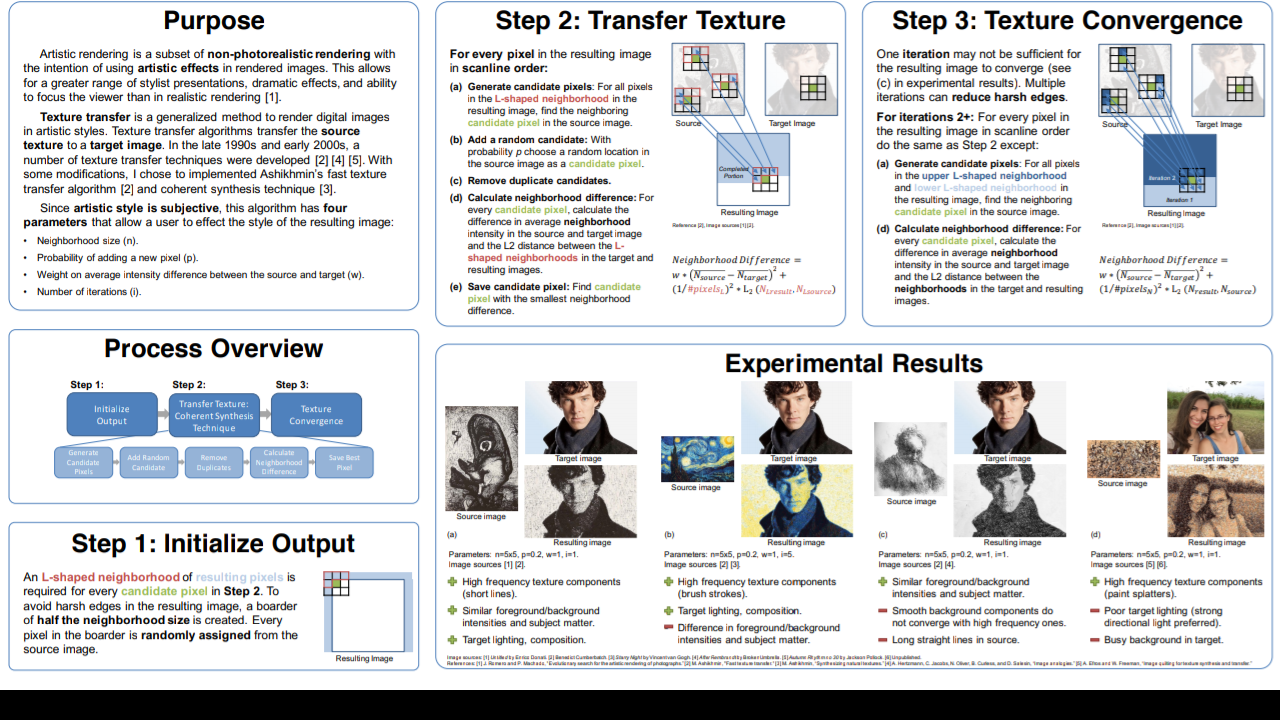Creating Drawings from Digital Images
Creating Drawings from Digital Images
Description
There are many algorithms out there for non-photorealistic rendering of images to look like drawings. Jin et al and Li et al create drawings from images by creating directional lines that match the intensity of the image. However, the resulting images don’t stylistically look like an artist drew them. Efros et al found that image quilting can be used to transfer a specific drawing style to an image such that it looks like it has actually been drawn by an artist. I will attempt to implement his algorithm to create drawings from digital images.
Plan
I believe the following steps will be necessary to creating drawings from digital images that resemble the drawings of famous artists.
1. Split the source texture (for example Enrico Donati’s drawing) into overlapping blocks of size B.
2. Split the source image into overlapping blocks of size B.
3. Choose a block from the source texture such that it has similar intensity as of the block in the source image and such that the overlap with other blocks meets some sort of similarity threshold.
4. Find the minimum cost boundary between the new block and the previously pasted
blocks and then paste the new block into the image respecting the boundary.
5. Update existing algorithm until it produces desired results. On suggested update is to
repeat the algorithm multiple times with decreasing block sizes
Alexei A. Efros and William T. Freeman. 2001. Image quilting for texture synthesis and transfer.
InProceedings of the 28th annual conference on Computer graphics and interactive
techniques(SIGGRAPH '01). ACM, New York, NY, USA, 341-346.
Nan Li and Zhiong Huang. 2003. A feature-based pencil drawing method. In Proceedings of the
1st international conference on Computer graphics and interactive techniques in Australasia and
South East Asia (GRAPHITE '03). ACM, New York, NY, USA, 135-ff.
Wang Jin, Bao Hujun, Zhou Weihua, Peng Qunsheng, and Xu Yingqing. 2002. Automatic
image-based pencil sketch rendering. J. Comput. Sci. Technol. 17, 3 (May 2002), 347-355.
DOWNLOAD SOURCE CODE CLICK HERE
Description
There are many algorithms out there for non-photorealistic rendering of images to look like drawings. Jin et al and Li et al create drawings from images by creating directional lines that match the intensity of the image. However, the resulting images don’t stylistically look like an artist drew them. Efros et al found that image quilting can be used to transfer a specific drawing style to an image such that it looks like it has actually been drawn by an artist. I will attempt to implement his algorithm to create drawings from digital images.
Plan
I believe the following steps will be necessary to creating drawings from digital images that resemble the drawings of famous artists.
1. Split the source texture (for example Enrico Donati’s drawing) into overlapping blocks of size B.
2. Split the source image into overlapping blocks of size B.
3. Choose a block from the source texture such that it has similar intensity as of the block in the source image and such that the overlap with other blocks meets some sort of similarity threshold.
4. Find the minimum cost boundary between the new block and the previously pasted
blocks and then paste the new block into the image respecting the boundary.
5. Update existing algorithm until it produces desired results. On suggested update is to
repeat the algorithm multiple times with decreasing block sizes
Alexei A. Efros and William T. Freeman. 2001. Image quilting for texture synthesis and transfer.
InProceedings of the 28th annual conference on Computer graphics and interactive
techniques(SIGGRAPH '01). ACM, New York, NY, USA, 341-346.
Nan Li and Zhiong Huang. 2003. A feature-based pencil drawing method. In Proceedings of the
1st international conference on Computer graphics and interactive techniques in Australasia and
South East Asia (GRAPHITE '03). ACM, New York, NY, USA, 135-ff.
Wang Jin, Bao Hujun, Zhou Weihua, Peng Qunsheng, and Xu Yingqing. 2002. Automatic
image-based pencil sketch rendering. J. Comput. Sci. Technol. 17, 3 (May 2002), 347-355.
DOWNLOAD SOURCE CODE CLICK HERE




Comments
Post a Comment